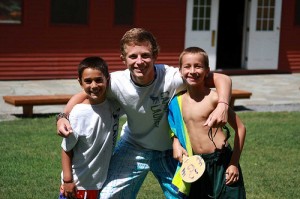 There are an estimated 1.2 million summer camp staff in the United States, and the numbers continue to grow steadily. Now, you might think, “Why should I pursue a camp job over an internship?” Well, working at a camp gives you the opportunity to earn more than just cash. Internships are all about gaining skills and that’s exactly what working at a camp provides. The question is, how is working at a camp better than an internship?
There are an estimated 1.2 million summer camp staff in the United States, and the numbers continue to grow steadily. Now, you might think, “Why should I pursue a camp job over an internship?” Well, working at a camp gives you the opportunity to earn more than just cash. Internships are all about gaining skills and that’s exactly what working at a camp provides. The question is, how is working at a camp better than an internship?
The biggest reason: Working at a camp helps you develop skills that will not only build your resume, but will last you a long time to come. You have an opportunity to lead from the front and solve problems, in addition to fulfilling your responsibilities with utmost sincerity. Working at camp offers real-life experiences that cannot be learned behind an office desk.
There are many benefits you can gain by working at camp:
- You develop a better self-understanding
- You enhance personal growth
- You master problem-solving skills
- You have a positive and significant influence on the lives of children
- You expand/develop a network of peer relations.
How is Working at Camp Better than an Internship?
It Builds Character along with Your Resume
If you do not have character, your resume is pretty much useless. If you make a comparison, you will notice that most interns count the minutes until they are finally done with work. On the other hand, camp counselors and camp staff dedicate their summers. Why do they do it? They enjoy what they do! When you work at a camp, you learn to dedicate your time for things besides yourself, as you have the opportunity to deal with adults, kids and other counselors.
It’s Not Only about the Money
When you work at a camp, you not only show up every morning because you are earning and saving good money, you show up because your job involves spreading smiles and happiness. You are not confined to an undersized desk, relentlessly waiting for payday. Instead, the beautiful scenery of Maine is your office and putting smiles on campers’ faces outweighs the thought of the next paycheck.
You Make Kids Smile Instead of Customers
It’s not uncommon to come across interns pretending to be extra nice so they can make a sale. A camp job, however, revolves around campers and making them happy. Getting an authentic laugh or smile out of a camper is much more enjoyable than selling a particular product to a random customer.
You Learn to Be Selfless Not Selfish
While interns spend most of their time pretending to be busy or surfing the web, every minute you spend at camp is devoted to the campers. Each minute of your time is spent for others, not just for yourself. After all, have you ever seen an intern worrying about the progress of their company they work for, as much as they do for themselves? If you’ve been considering a job at camp, why not go for it? You will have the experience of a lifetime, meet staff and campers from around the world, and gain experience that will be beneficial for years to come.
If you’ve been considering a job at camp, why not go for it? You will have the experience of a lifetime, meet staff and campers from around the world, and gain experience that will be beneficial for years to come.










 According to American Camp Association
According to American Camp Association Here are some benefits you can expect from the job:
Here are some benefits you can expect from the job:
 Kelly learned that “being a camp counselor is all about leading a group of people into enthusiasm,” and that continues to be important in her job today. Just as campers and staff still gather each summer—sometimes for the first time and sometimes after waiting all year just to come back—Kelly went to camp! There, learning, personal growth, fun and friendship blossomed during intense times and life-long skills and ideas were forged. Camp operates as a microcosm of experiences that mirror real-life situations as everyone negotiates friendships and different personalities, tries new things and finds their unique role in the group. If you’ve been a camper or a counselor, you know what I’m talking about. You also know that facilitating fun and teamwork takes creativity and enthusiasm. (If you’re thinking about being a counselor, camp is an incredible way to learn skills and prepare for future jobs!)
Kelly learned that “being a camp counselor is all about leading a group of people into enthusiasm,” and that continues to be important in her job today. Just as campers and staff still gather each summer—sometimes for the first time and sometimes after waiting all year just to come back—Kelly went to camp! There, learning, personal growth, fun and friendship blossomed during intense times and life-long skills and ideas were forged. Camp operates as a microcosm of experiences that mirror real-life situations as everyone negotiates friendships and different personalities, tries new things and finds their unique role in the group. If you’ve been a camper or a counselor, you know what I’m talking about. You also know that facilitating fun and teamwork takes creativity and enthusiasm. (If you’re thinking about being a counselor, camp is an incredible way to learn skills and prepare for future jobs!)
 Once a young adult goes to college, no matter how much they miss home or home cooking, they are changed forever! One past camp counselor puts it this way, “After my first undergraduate winter break back home I decided I didn’t want to return home for three months during summer. College gave me independence/freedom from parental supervision, and I wanted to continue the experience through summer employment.”
Once a young adult goes to college, no matter how much they miss home or home cooking, they are changed forever! One past camp counselor puts it this way, “After my first undergraduate winter break back home I decided I didn’t want to return home for three months during summer. College gave me independence/freedom from parental supervision, and I wanted to continue the experience through summer employment.”